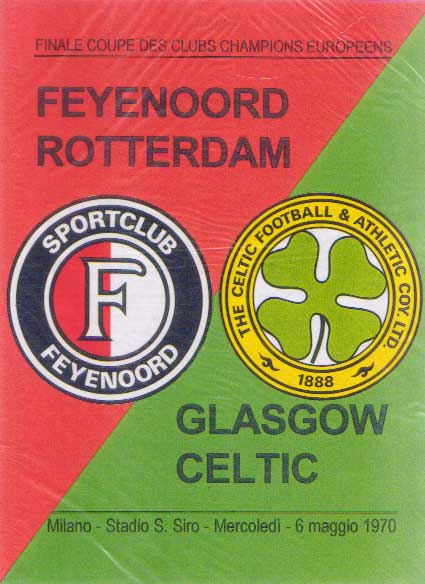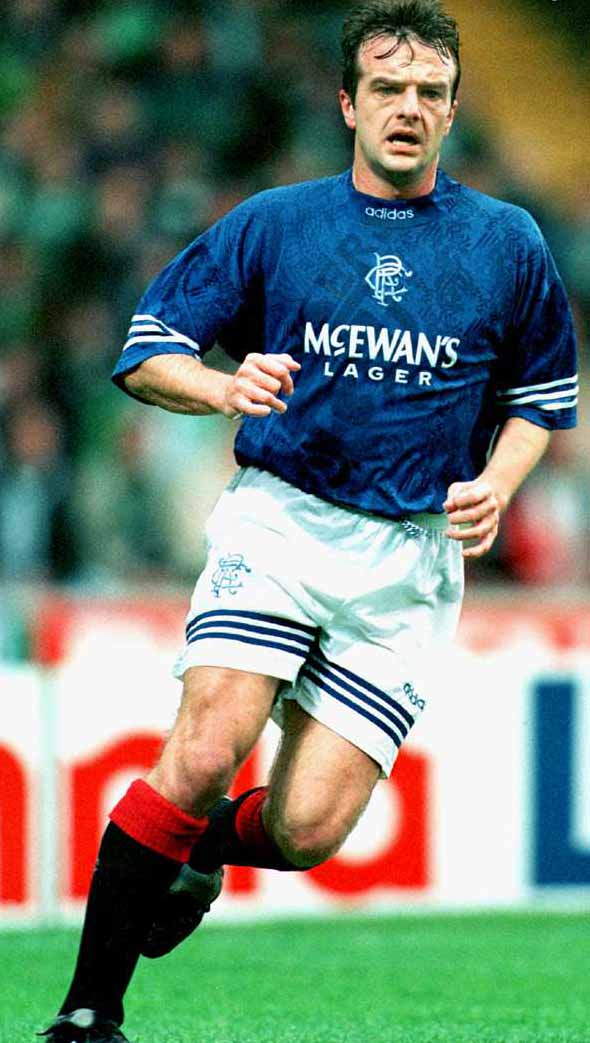Whereas in Lisbon we had sun, blue skies and open stands. At the San Siro we had rain, enclosed darkness and the infernal cacophony of the claxon horns of the Dutch hordes. The contrast could not have be greater. Even before a ball was kicked, the men from Rotterdam eyed those in green and white hungrily. Wim Van Hanegem the legendary midfielder remembered the Celtic warm up, which involved a lot of elaborate ball tricks in dismissive terms; “ A group of circus artists!’.
The Dutch had however done their homework and stifled Jinky Johnstone from the very first minute, on those rare occasions he received the ball he was closed down immediately. It was in the midfield that Feyenoord took control, and outmuscled and outfought the labouring Celtic players. Even to this day, Bertie Auld still cannot get over the ability and work rate of the Dutchmen.
Very much against the run of play, Celtic opened the scoring with a Tommy Gemmell thunderbolt, thus making him one of the few players to score in two European Cup finals. This merely served to sting Feyenoord into more decisive action. Some very poor defending by Celtic allowed Feyenoord to draw level in the first half. The second half was one way traffic, and the shocked Celtic support could only look on in astonishment as their heroes were forced back against a vibrant, fluid team whom they believed before the game would present no difficulty for the unofficial champions of Britain.
Celtic almost held out for a replay, until in the last minutes of extra time another avoidable goal was scored. Feyenoord deserved their win and only the most churlish would have denied them their victory.
When the post mortems were conducted the players were blamed, the manager was blamed, even the weather was blamed! The answer was much simpler to find. Feyenoord was actually an excellent team, with an outstanding manager with many gifted players.
Ernst Happel the Austrian who went on to win another European Cup as manager of Hamburg, showed that he was an astute manager who could more than match Jock Stein on the night. His team looked physically much stronger and faster than Celtic, and in an ironic twist on Lisbon, Celtic had declined into the role of Inter Milan and Feyenoord had evolved into Celtic.
I have no embarrassment in saying that Celtic lost to a better team, and even had tactical changes prevailed, Celtic would have struggled to overcome Feyenoord that night. Dutch football was in the ascendancy and Feyenoord became the first Dutch team to win football’s biggest trophy. This would be the precursor for other Dutch teams, notably Ajax who totally dominated European football in the early seventies. The Dutch national team, which finished as runners up in the World Cup of 1974, was comprised of Ajax players, plus the likes of Wim Jansen and Wim Van Hanegem who played against Celtic in the San Siro. To use a pretentious phrase, the “tide of history was against Celtic”. The Dutch revolution had just broken out and with it, the concept of total football. I remember watching Celtic play Ajax in 1971 in a European Cup quarter final and it was evident to me at least, that under Rinus Michels as coach, and Johan Cruyff as captain, Celtic were playing against a world class side. History was never kind to Jock Stein and the Celtic players that night in the San Siro, however with a bit of hindsight and a sense of proportion, we see that just maybe Celtic’s performance wasn’t as bad as it seemed.
The Lisbon Lions team had already broken up with several new players brought in, vitally though the genuine talent of the likes of Dalglish and Macari were too young to fill the gap. David Hay played that night and a very young George Connelly came on as a late substitute.
Most days I pass the Feyenoord stadium which is on the main railway line to Amsterdam. The “Kuip” now is looking somewhat dilapidated and there are ambitious plans to develop a new multi-purpose stadium in the city of Rotterdam. Feyenoord fans enjoy a certain reputation in The Netherlands, but there is no doubting their passion. There are of course major differences between Celtic and Feyenoord, but they also have a lot in common.
Like Celtic, they won football’s ultimate prize in the same era, the likes of which we will never see again. Feyenoord supporters also believe that Feyenoord should play in a certain way, just as Celtic supporters believe in the Celtic way. When they meet up, it is as friends not rivals. Feyenoord also have a healthy dislike of Rangers. If you have to lose, then let it be to kindred spirits!




